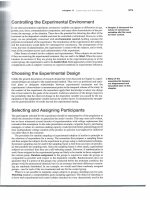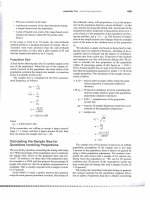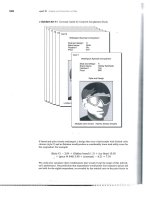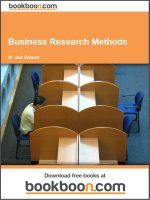Business research methods
Bạn đang xem bản rút gọn của tài liệu. Xem và tải ngay bản đầy đủ của tài liệu tại đây (5.34 MB, 308 trang )
1-1
Part One
INTRODUCTION TO
BUSINESS RESEARCH
1-2
McGraw-Hill/Irwin
© 2003 The McGraw-Hill Companies, Inc.,All Rights Reserved.
Chapter One
RESEARCH IN BUSINESS
1-3
What is Business Research?
• A systematic Inquiry whose objective is
to provide information to solve
managerial problems.
1-4
Why Study Research?
• Research provides you with the
knowledge and skills needed for the
fast-paced decision-making
environment
1-5
Why Managers need Better Information
• Global and domestic competition is
more vigorous
• Organizations are increasingly
practicing data mining and data
warehousing
1-6
The Value of Acquiring Research Skills
• To gather more information before
selecting a course of action
• To do a high-level research study
• To understand research design
• To evaluate and resolve a current
management dilemma
• To establish a career as a research
specialist
1-7
Types of Studies Used to do Research
•
•
•
•
1-8
Reporting
Descriptive
Explanatory
Predictive
Different Styles of Research
• Applied Research
• Pure Research/Basic Research
1-9
What is Good Research?
• Following the standards of the scientific
method
– Purpose clearly defined
– Research process detailed
– Research design thoroughly planned
– Limitations frankly revealed
– High ethical standards applied
1-10
What is Good Research? (cont.)
• Following the standards of the scientific
method (cont.)
– Adequate analysis for decisionmaker’s needs
– Findings presented unambiguously
– Conclusions justified
– Researcher’s experience reflected
1-11
The Manager-Researcher Relationship
• Manager’s obligations
– Specify problems
– Provide adequate background information
– Access to company information gatekeepers
• Researcher’s obligations
– Develop a creative research design
– Provide answers to important business
questions
1-12
Manager-Researcher Conflicts
• Management’s limited exposure to
research
• Manager sees researcher as threat to
personal status
• Researcher has to consider corporate
culture and political situations
• Researcher’s isolation from managers
1-13
When Research Should be Avoided
• When information cannot be applied to
a critical managerial decision
• When managerial decision involves little
risk
• When management has insufficient
resources to conduct a study
• When the cost of the study outweighs
the level of risk of the decision
1-14
2-1
Part One
INTRODUCTION TO
BUSINESS RESEARCH
2-2
McGraw-Hill/Irwin
© 2003 The McGraw-Hill Companies, Inc.,All Rights Reserved.
Chapter Two
APPLYING SCIENTIFIC
THINKING TO
MANAGEMENT PROBLEMS
2-3
Sources of Knowledge
2-4
• Empiricists attempt to describe, explain,
and make predictions through
observation
• Rationalists believe all knowledge can
be deduced from known laws or basic
truths of nature
• Authorities serve as important sources
of knowledge, but should be judged on
integrity and willingness to present a
balanced case
The Essential Tenets of Science
• Direct observation of phenomena
• Clearly defined variables, methods, and
procedures
• Empirically testable hypotheses
• Ability to rule out rival hypotheses
• Statistical justification of conclusions
• Self-correcting process
2-5
Ways to Communicate
• Exposition
– descriptive statements that merely state
and do not give reason
• Argument
– allows us to explain, interpret, defend,
challenge, and explore meaning
2-6
Important Arguments in Research
• Deduction is a form of inference that
purports to be conclusive
• Induction draws conclusions from one
or more particular facts
2-7
The Building Blocks of Theory
•
•
•
•
•
•
•
2-8
Concepts
Constructs
Definitions
Variables
Propositions and Hypotheses
Theories
Models
Understanding Concepts
• A concept is a bundle of meanings or
characteristics associated with certain
events, objects, conditions, situations,
and behaviors
• Concepts have been developed over
time through shared usage
2-9
Understanding Concepts
• The success of research hinges on:
– how clearly we conceptualize
– how well others understand the
concepts we use
2-10
What is a Construct?
• A construct is an image or idea
specifically invented for a given research
and/or theory-building purpose.
2-11









